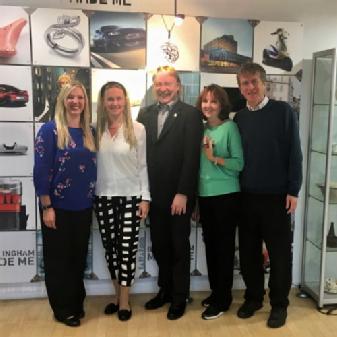IER News & blogs
Bad Jobs in Europe
 IER’s Dr Sangwoo Lee presented one of his recent research papers at the London School of Economics CEP Well-being Seminar on 22 Feb 2024.
IER’s Dr Sangwoo Lee presented one of his recent research papers at the London School of Economics CEP Well-being Seminar on 22 Feb 2024.
This paper, co-authored with Prof Francis Green at UCL, introduces a new well-being related threshold for bad jobs. The conceptualisation of bad jobs often entails low job quality, typically associated with job insecurity or low pay. These conceptualisations often adopt a simplistic framework, focusing on a single dimension of job quality, thereby leading to a potential misclassification of bad jobs.
New IER project starts on digital and green skills for Industry 5.0
 In January, IER’s new collaborative project ‘Bridges 5.0’ kicked off with a launch in Brussels attended by officials from the European Commission. The project seeks to identify the digital and green skills needed to support Industry 5.0 and then develop training pathways for companies to acquire these skills. The project is led by TNO in the Netherlands and involves 21 partners including high profile companies as well as other universities and, within Warwick, Warwick Manufacturing Group. For further details contact Chris Warhurst: c.warhurst@warwick.ac.uk
In January, IER’s new collaborative project ‘Bridges 5.0’ kicked off with a launch in Brussels attended by officials from the European Commission. The project seeks to identify the digital and green skills needed to support Industry 5.0 and then develop training pathways for companies to acquire these skills. The project is led by TNO in the Netherlands and involves 21 partners including high profile companies as well as other universities and, within Warwick, Warwick Manufacturing Group. For further details contact Chris Warhurst: c.warhurst@warwick.ac.uk
New report from IER on European working conditions

Eurofound has published a new report on Upward Convergence in Working Conditions in Europe. The project was led by IER (Prof. Chris Warhurst and Dr Sally Wright) and included colleagues from the University of Salamanca led by Prof. Rafa Munoz de Bustillo Llorente.
The research found upward convergence has occurred for the EU as a whole for six of the seven dimensions of working conditions: physical environment, work intensity, working time, social environment, skills and discretion, prospects and earnings. However country differences exist within the EU.
Lifelong guidance in the EU
 IER and FIER at the University of Jyväskylä have been working on a project commissioned by the EC DG EMPL researching lifelong guidance policy and practice in the EU. The team, led by Sally-Anne Barnes, organised a successful workshop in Brussels at the beginning of October to discuss the findings of the study. This event was attended by 32 experts in guidance and lifelong learning from across Europe.
IER and FIER at the University of Jyväskylä have been working on a project commissioned by the EC DG EMPL researching lifelong guidance policy and practice in the EU. The team, led by Sally-Anne Barnes, organised a successful workshop in Brussels at the beginning of October to discuss the findings of the study. This event was attended by 32 experts in guidance and lifelong learning from across Europe.
Following this, the research findings were presented at the European Vocational Skills Week 2019 held in Helsinki. The interactive session on 'guidance for lifelong learning' was streamed live and debated what support was needed to promote lifelong guidance.
The research report is due to be published in 2020.
UK Employment Policy in a Changing Europe - Warwick Brexit Briefings on Employment

A series of research-based policy briefings, organized by the University of Warwick and its Connecting Research on Employment and Work (CREW) network, will take place over four consecutive weeks in November and early December 2017 in London.
Experts from the Warwick Institute for Employment Research, Warwick Law School and Warwick Business School's Industrial Relations Research Unit evaluate the employment policy, rights, skills and labour market implications of the UK's withdrawal from the EU and make research-based recommendations for future development of policy in these areas, as the UK leaves the EU.
Next dates for the briefing, which will be held at Central Hall, Maurice Barnett room, Westminster, London, SW1H 9NH from 12:30-1:30, with lunch available from 12:00:
- 14 November - Migration and Skills: Guglielmo Meardi, Anne Green & Erika Kispeter
- 23 November - Job Loss and Job Creation – Pitfalls and Opportunities?: Nigel Driffield
- 27 November - Training Funds for the Unemployed: Chris Warhurst, Daria Luchinskaya & Peter Dickinson
- 7 December - Employment Rights: Ania Zbyszewska & Alan Neal
If you would like to RSVP to any of the events, please contact Lynne Marston: L.Marston@warwick.ac.uk.
